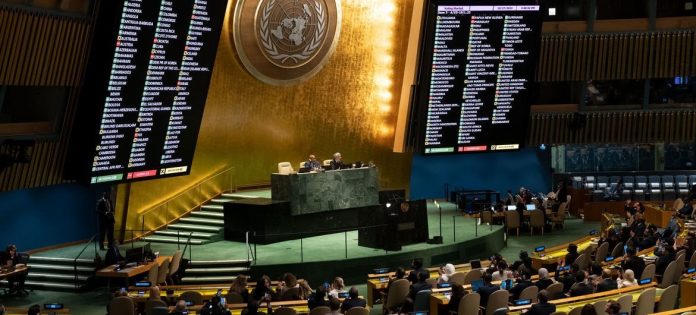The resolution, he claimed, “is a clear stand against Israel’s war, against the killing of Palestinians, against war crimes, on the side of international law.”

New Delhi, October 23: The interceding night of 27th and 28th October 2023 in Palestine brought sheer terror and panic as Israeli forces significantly increased their bombardment of Gaza, with the region facing a near-total communications blackout, the UN General Assembly adopted a resolution titled “Protection of civilians and upholding legal and humanitarian obligations”, calling for an “immediate, durable and sustained humanitarian truce leading to a cessation of hostilities.”
The final breakdown of the vote included 120 members in favour and 14 against, with 45 abstentions. The resolution required a two-thirds majority of members present and voting to be adopted. Countries that voted against the resolution include the United States, Austria, Croatia, the Czech Republic, Fiji, Guatemala, Hungary, Israel, Marshall Islands, Micronesia, Nauru, Papua New Guinea, Paraguay, and Tonga.
Adopted at the 10th Emergency Special Session meeting on the situation in the Occupied Palestinian Territory, the draft resolution expresses “grave concern” over the “latest escalation of violence.” It condemned “all acts of violence against Palestinian and Israeli civilians, including all acts of terror and indiscriminate attacks, as well as all acts of provocation, incitement and destruction.”
It also demanded that “all parties immediately and fully comply with their obligations under international law.”
The Emergency Special Session will reconvene on Tuesday, with countries continuing their debate. Meanwhile, with the intensification of Israeli bombing on Gaza and the announcement that the Israeli forces are expanding ground operations, aid and rescue work has come to a near-standstill, with aid workers and journalists being unable to communicate with each other. Palestinians outside of Gaza and in the vast Palestinian diaspora shared their panic-stricken messages on social media as they could no longer reach their families and friends.
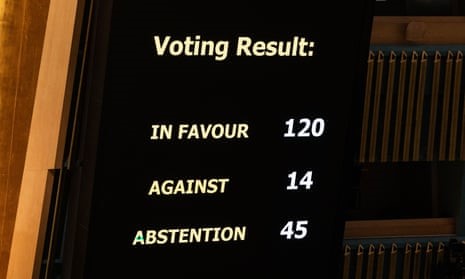
Before the UNGA voted on the resolution, the 193-member body considered an amendment to the text, proposed by Canada and co-sponsored by the United States. The amendment asked for inserting a paragraph in the resolution that would state that the general assembly “unequivocally rejects and condemns the terrorist attacks by Hamas that took place in Israel starting on 7 October 2023 and the taking of hostages, demands the safety, well-being and humane treatment of the hostages in compliance with international law, and calls for their immediate and unconditional release”.
The amendment, which was defeated due to its failure to muster the required two-thirds majority, received 88 votes in favour (including India) to 55 against, with 23 abstentions.
The resolution was drafted by a group of 22 Arab countries and was proposed by Jordan. The resolution’s co-sponsors were Bangladesh, Maldives, Pakistan, Russia, and South Africa. Jordan said a vote against the resolution would amount to approving a “senseless war” and “senseless killing.” However, unlike resolutions of the UN Security Council, resolutions of the UNGA are not legally binding. The UN Security Council, which can pass binding resolutions, has been unable to pass a motion on the situation, due to the veto powers that states like Russia and the US hold.
According to a report in The Wire, the emergency session was called under the “Uniting for Peace” mandate, allowing the General Assembly to take action when the UN Security Council is gridlocked.
Nevertheless, it carries some geopolitical weight and moral authority or what Al Jazeera called “the barometer of global opinion”, reflecting how the Palestinian cause has garnered popular support, and how the sheer depth of Israeli violence has garnered global outrage, despite the United States’ stubborn and continued support.
India’s Controversial Abstention
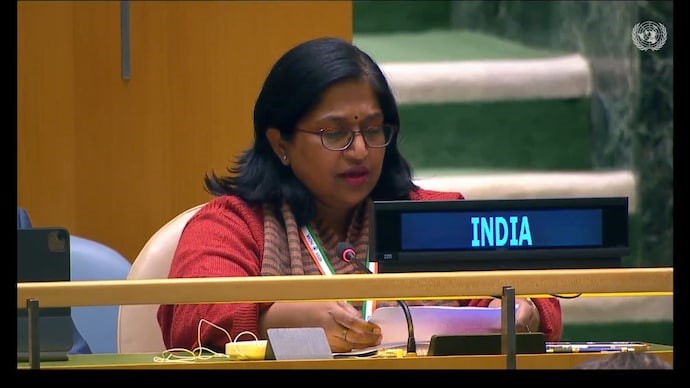
In the UNGA, countries put forward arguments for and against the amendment, and explained their positions on the adopted resolution. According to a report in the Indian Express, India’s statement at the UNGA delivered by its deputy permanent representative to the UN, Yojna Patel attempted to explain the decision to abstain as resting on the fact that the resolution did not adequately condemn Hamas and that the “terror attacks in Israel on 7th October were shocking and deserve condemnation.”
It described terrorism as “a malignancy and knows no borders, nationality, or race”, and asked the world not to “buy into any justification of terror acts.” It also offered some balancing statements, expressing concern over casualties in Gaza, highlighting India’s contribution to the aid efforts as well. It also reiterated India’s commitment to the two-state solution.
Responses
Writing on X (formerly Twitter), Israeli Foreign Minister Eli Cohen termed the resolution “despicable”, saying that they outrightly rejected the call for a cease-fire, reiterating their intention to eliminate Hamas. In a televised message, the Chief of the General Staff of Israel, Herzi Halevi, said, “This war has stages and today we are moving to the next stage. Our forces are currently operating on the ground in the Gaza Strip.”
Meanwhile, al-Qassam Brigades spokesperson Abu Obaida has said that if Israeli forces are willing to resolve the hostage crisis, Hamas will reciprocate – with the price of the returning of Israel captives being the release of all Palestinian prisoners held in Israel – estimated to be around 6,600 people.
Patrick Wintour, the diplomatic editor of The Guardian wrote that “The US has ended up looking quite badly isolated after only 12 countries joined Washington and Israel at the UN general assembly” in their rejection of the motion, arguing that it was remarkable that even France, Spain and the UK refused to join the US in voting against the motion.
The Jordan foreign minister Ayman Safadi, expressed his praise for the outcome of the vote, saying that the UNGA had “spoken for justice”. The resolution, he claimed, “is a clear stand against Israel’s war, against the killing of Palestinians, against war crimes, on the side of international law.”
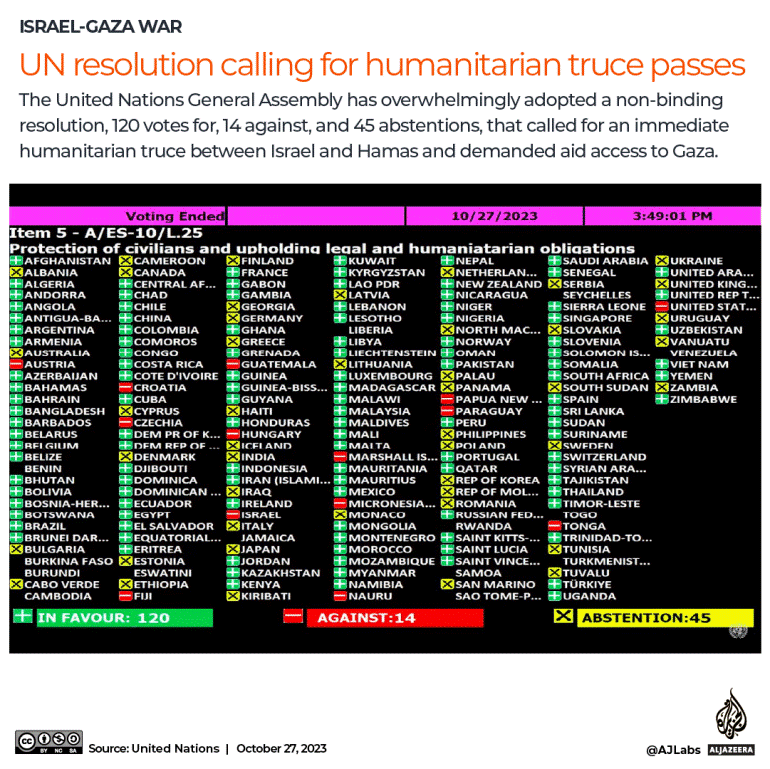
India was the odd one out in South Asia, with all the other seven nations voting in favour of the resolution. In domestic reactions, Congress general secretary Priyanka Gandhi criticised India’s abstention, taking to X to air her views.
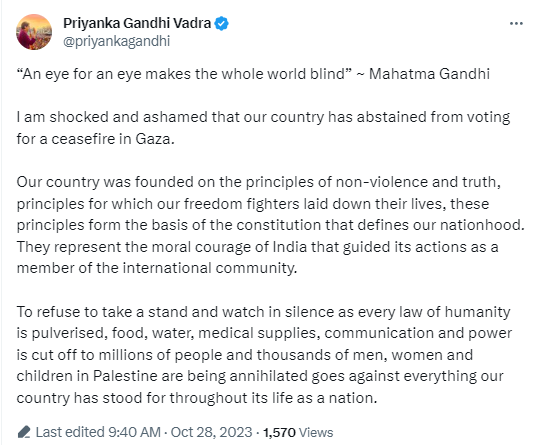 All India Majlis-e-Ittehaul Muslimeen (AIMIM) chief Asaduddin Owaisi pointed out that India had been isolated in its stand, arguing that, “This is a humanitarian issue, not a political one,” said All India Majlis-E-Ittehadul Muslimeen (AIMIM) chief Asaduddin Owaisi, according to a report in The Hindu.
All India Majlis-e-Ittehaul Muslimeen (AIMIM) chief Asaduddin Owaisi pointed out that India had been isolated in its stand, arguing that, “This is a humanitarian issue, not a political one,” said All India Majlis-E-Ittehadul Muslimeen (AIMIM) chief Asaduddin Owaisi, according to a report in The Hindu.


